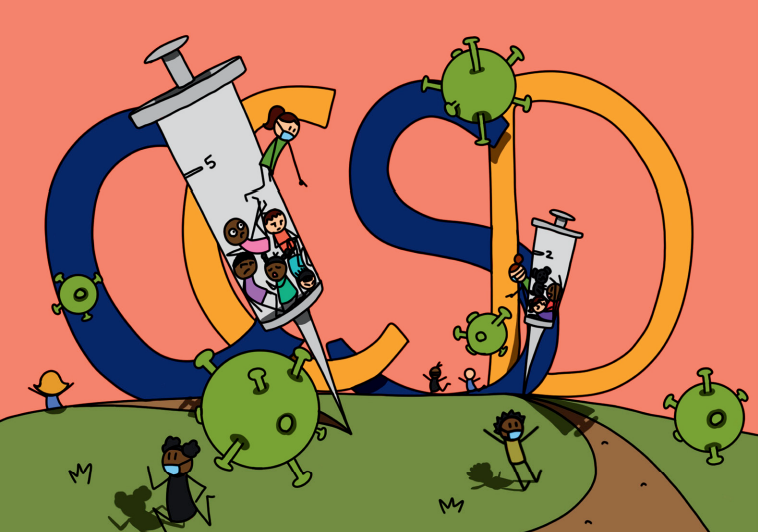An illustration shows the Clarke County School District community being overtaken by the coronavirus while vaccinated individuals encourage others to join them in overcoming the pandemic. Vaccine hesitancy in the CCSD is negatively affecting students academically and straining many other sectors of Athens. Illustration by Eleanor Robinson
Because the COVID-19 vaccine is a crucial element to moving past the pandemic, the CCSD community must work together to overcome vaccine hesitancy.
No, the vaccine won’t give you COVID-19. It won’t implant a microchip in your bloodstream and it won’t alter your DNA. It will, fortunately, help the Clarke County School District return to pre- pandemic normalcy.
On Dec. 11, 2020, the Food and Drug Administration approved the Pfizer COVID-19 vaccine for Emergency Use Authorization (EUA) for people ages 16 and up, and later extended access too all children under 16. Though the vaccine will not make its recipients completely immune to the virus, it will significantly reduce their transmission potential and reduce their chance of serious illness should they test positive.
Though the vaccine will not make its recipients completely immune to the virus, it will increase their chance of survival, should they test positive
“COVID-19 vaccines are effective and are a critical tool to bring the pandemic under control; however, no vaccine is 100% effective at preventing illness,” the Centers for Disease Control and Prevention (CDC) website stated. “The risk of infection, hospitalization, and death are all much lower in vaccinated people compared to unvaccinated.”
Despite these benefits, according to the Georgia Department of Public Health, only 48.5% of Clarke County residents are fully vaccinated. The county hit 40% at the end of May, showing that new vaccinations mostly levelled out months ago. Those who aren’t currently vaccinated aren’t likely to make large strides on their own.
The impact of such a large unvaccinated population extends beyond those infected with the virus. According to Commercial Appeal, pressure on healthcare workers at Piedmont Athens Regional Hospital rose to a recent high on Oct. 8 with 98.2% of ICU beds full. While this number has since decreased to 86% as of Dec. 3, this is still only 8.4 empty beds. This dangerous shortage of space is preventable through vaccination, seeing as 96% of hospitalized COVID-19 patients are unvaccinated.
